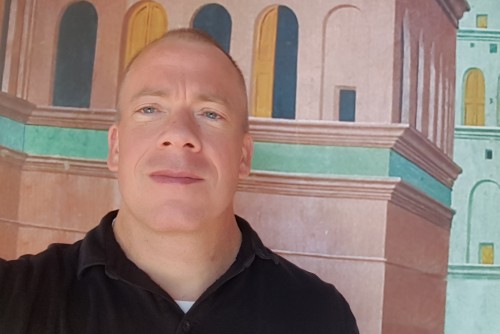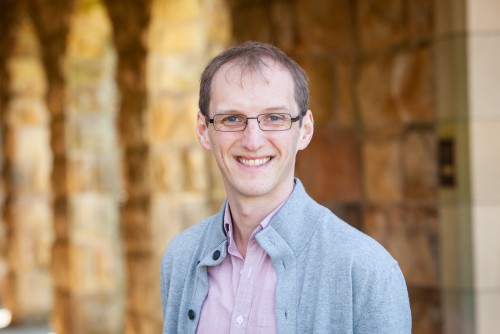Brian Reynolds C'90 featured on Sewanee website
Philosophy major Brian Reynolds C'90 talks about how his training in the Sewanee philosophy department led to his current job as a video game designer.
Does God exist? What is the best form of government? Do we have free will? What is love? Philosophers study the most fundamental and enduring questions of human existence, cultivating the essential skills of rational argument, critical thinking, and respect for other points of view.
At Sewanee, you’ll become acquainted with a wide range of philosophical theories and ideas, from the classic works of Plato and Aristotle to cutting-edge research in bioethics and the philosophy of law. You’ll be challenged to develop and defend your own philosophical beliefs using reason and argument, and learn to engage critically and respectfully with the opinions of others.
Sewanee’s broad offerings in the history of philosophy will allow you to enter into conversation with figures like Kierkegaard, Nietzsche, and Confucius, whilst our extensive applied ethics program – environmental ethics, medical ethics, and business ethics – will help you to apply philosophical theory to the most pressing problems of the 21st century.
With their exceptionally rigorous training in critical thinking and problem solving, philosophy majors tend to score highly on the LSAT and other graduate entry exams, and are well-equipped to enter the job market in a variety of different fields.
Sewanee graduates secure positions in a variety of fields. Some you would expect, others are a bit of a surprise. Sewanee prepares you for your profession and your passion. Below is a sampling of recent graduates' first jobs.
Sewanee graduates enjoy extraordinary acceptance rates to top graduate and pre-professional programs–about 95 percent to law school and over 85 percent to medical school. Below is a sampling of where Sewanee grads continue their education.
In his book, Peterman offers Western thinkers a new, sophisticated understanding of Confucius as a philosopher.
This book seeks to defend an interpretation of Confucius’s project, depicted in the centrally important early Confucian text, Analects, as operating in what Wittgenstein scholar Cora Diamond, taking a phrase from Wittgenstein, refers to as the “realistic spirit.” The “realistic spirit,” as distinct from the philosophical realist, seeks, as she puts it, to clarify “our life” with concepts, including ethical life, in all its complexity, suspicious of the simplification and nonsense bound up with traditional metaphysics.
Although the Socratic requirement that versions of moral inquiry not be self-undermining is a basic principle for evaluation of competing versions of moral inquiry, MacIntyre’s use of it to challenge the Confucian moral tradition is unsuccessful. Although I explicitly take up MacIntyre’s challenge to Confucianism in Chapter 7, the whole project of the book can be seen as offering an account of three key aspects of the version of moral inquiry found in the centrally important Confucian text, the Analects, which offers a distinctive, credible version of moral inquiry. This approach to moral inquiry, like Wittgenstein’s quite similar approach to philosophical inquiry in the realistic spirit, gives central place to moral practices and to reflection on the meaning and significance of those practices by practitioners. Central to Confucian moral practices is the practice of ritual (禮 li). Confucian moral inquiry requires training in ritual, as well as reflection on the practice of ritual guided by a master of such ritual practice and reflection.
Confucius approaches moral inquiry in a way that avoids abstract, theoretical reflection on questions of moral epistemology and ontology. As a result, the presentation of the Analects’ approach to moral inquiry is not as fully developed as is required for systematic assessment. To solve this problem, I turn to the later writings of Ludwig Wittgenstein, who offers an approach to the relation between practice and reflection that is remarkably similar to Confucius’s. Drawing on Wittgenstein to develop an account of the early Confucian version of moral inquiry in Chapter 1, “Introduction: A Prologue to an Unlikely Project,” I use this version of moral inquiry later in the book to address a range of potential problems facing Confucian moral inquiry, which, if not adequately addressed, threaten to undermine it.
This piece was adapted with permission from "Whose Tradition? Which Dao?" published by SUNY Press, Copyright © 2015 by James F. Peterman.
An analysis of the major turning points in the development of the concept of the self in Western philosophical thought. The point of the analysis is to elucidate our contemporary conception and the problems with it in order to point to a solution to these problems. In so doing, possible answers to the questions of the nature of rationality, knowledge, faith, and the meaning of life are proposed.
An examination of philosophical issues surrounding the nature of law and legal reasoning. Topics include the conditions of legal validity, the nature of legal normativity, and its relation to other public manifestations of normativity (such as morality, religion, and etiquette); the limits and conditions of human liberty; the Constitutional status of rights to privacy; and the moral and legal justification of punishment.
A critical reading of selected philosophical and literary works that explore the nature and significance of religious faith. This course considers how literary narrative and philosophical analysis function distinctively in the dialogue of faith and reason. Major figures will include Pascal, Hume, Kierkegaard, Walker Percy, Flannery O'Connor, and C.S. Lewis.
"Philosophical questions do tend to have a particular character, but it isn’t one defined by the particular topics that these questions address. What’s characteristic of philosophical questions, I think, is not their subject matter, but their peculiar combination of fascination and intractability: they’re questions to which we’re perpetually drawn, questions that we can’t help but raise, but the answers to which often seem just as perpetually elusive. I suppose this characterization might seem to give philosophy a slightly tragic cast, depicting it as the pursuit of something that seemingly can’t be had, but in this respect I think philosophy and the questions it asks are continuous with life itself. Philosophy simply takes more seriously questions to which many of us are drawn anyway. The questions that first drew me into philosophy are a good example–questions about the existence of God and the relationship between reason and faith."

"What is true of most philosophers is certainly true of me: I cannot give an adequate account of my philosophical development without touching upon the period of my life which preceded my formal training as a philosopher. [It was in the military where] I began to see my way out of the cloud. For one thing, I gradually began to accept a new set of moral commitments. Before entering the Army, I had never heard anyone talk seriously about the notions of duty or character. Nor had I ever been confronted with the need for such virtues as integrity, honor, courage, or sacrifice. But I was now in the presence of men who clearly embodied these virtues, and who constantly and forcefully impressed upon us the need to embody them as well."

"I believe that everyone is capable of doing philosophy. No matter who you’re talking to, if you run through a list of philosophical questions, you will find one that hits a nerve. What does it really mean to love another person? Is beauty merely in the eye of the beholder? Does the government have the right to redistribute wealth? Is there any form of speech that ought to be prohibited? Is there an inevitable conflict between science and religion? How could a loving God allow innocent people to suffer? When people say that they aren’t interested in philosophy or that they don’t see the point of it, in my experience that is not because they haven’t thought about any of these questions, but because they have become convinced that no one else is likely to find their responses interesting or valuable. The job of teaching philosophy, as I understand it, is a matter of getting people to see that their views on these questions do matter, but also that it isn’t enough simply to state your opinions–you need to be able to support your claims with reasoned argument, and to be capable of understanding the arguments in favor of positions that are different from your own."
Carnegie Hall 201A, Ext. 1581
Philosophy major Brian Reynolds C'90 talks about how his training in the Sewanee philosophy department led to his current job as a video game designer.

The Center for Speaking and Listening will be your new favorite resource on campus. Check out this quiet space, use state-of-the-art equipment, and meet tutors ready to watch your speech and give constructive feedback. Design, develop, and practice delivering effective speeches with eloquence and confidence.

The roots of Greek and Latin and the power of their mythology helped propel Western civilization. Classics majors at Sewanee benefit from the study of Western civilization’s foundational languages and find that their influence extends to today’s world. From medical terminology and legal language to hard sciences and the English language itself, we are surrounded by the legacy of our intellectual ancestors.

Couple liberal arts with practical application. Learn to market yourself and your ideas. At Sewanee, we believe that the best preparation for a career is a broad-based, well-rounded education. Many of today’s leaders in commerce attribute their success to the critical thinking skills, writing and speaking skills, and study of the human experience that are the core of the liberal arts tradition. Couple your major with a business minor and see where it takes you!